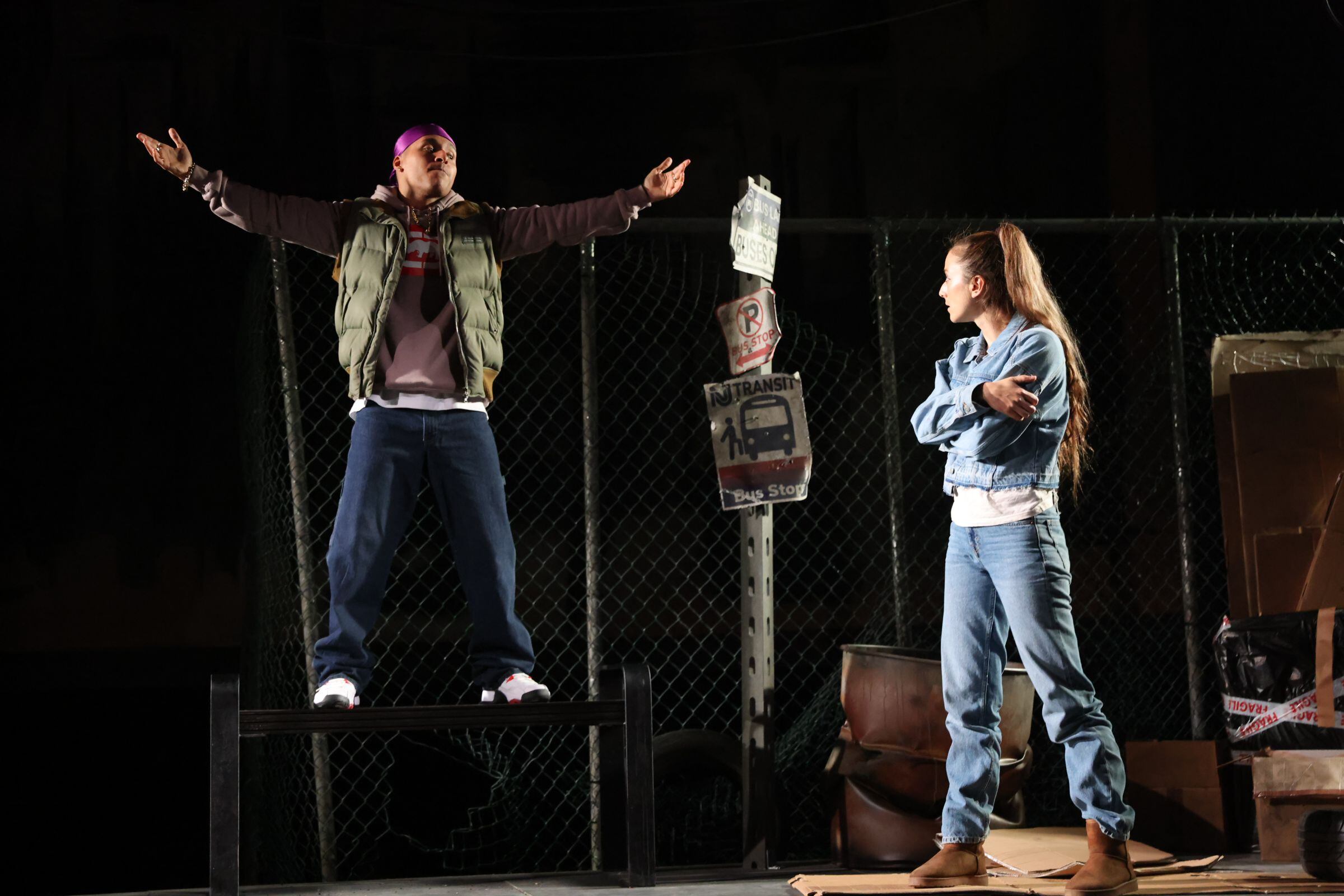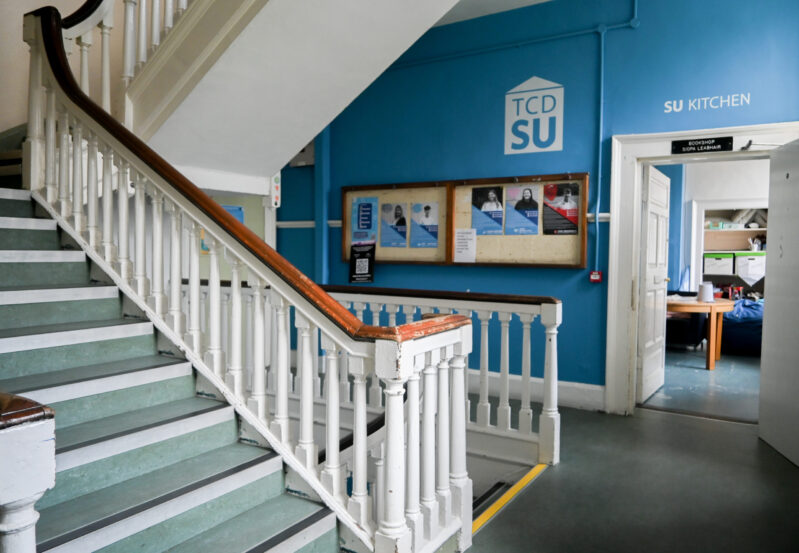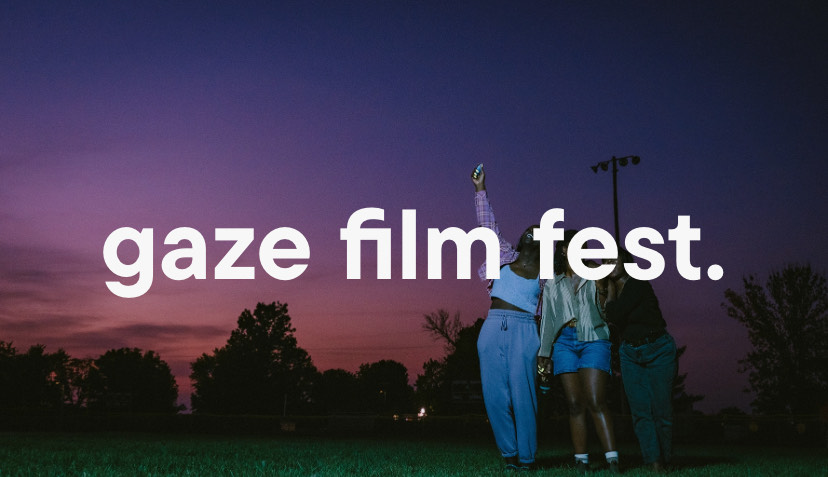
It’s a simple set, with watercolour blues and purples scoring the background. A natural landscape presenting the blurry grey wash of dawn or dusk or somewhere in between. There’s a pile of rubbish bins to the right, a fluorescent street lamp to the left and a bus stop dead centre. For an hour and forty minutes, we are stood at this bus stop, watching as Darja’s life unfolds. As for Darja in life, the present space is all there is for the audience, and a bus that never shows up.
Ironbound by Martyna Majok debuted on the Peacock stage of the Abbey Theatre on October 3rd, 2023, in a month-long run which came to a close on November 11th. The play follows Darja (Olga Fedori), a Polish immigrant woman trying to make a life for herself in New Jersey, and spans twenty-two years of her life. From her arrival to America in her twenties with her first husband and great love, Maks (Konstantin Stanchev), to her strained and contractual relationship with New Jerseyan Tommy (Aonghus Óg McAnally) over two decades later. The play opens with Darja and Tommy’s relationship mid-break-down.
My sister roped me into letting her tag along to come and watch the show with me while she was in Dublin for the week. Though I told her I was the press and couldn’t possibly mix business with pleasure, she wasn’t having any of it. We sat down for a wind-down half-pint after the show, choosing a table by the window to monitor the 27b bus stop so we could down the drinks and dash at a moment’s notice if it decided to show up. We traded thoughts and, pretty soon, a highlight reel emerged, beginning with Olga Fedori’s stage presence. Her portrayal of Darja felt completely authentic and organic. She seemed to pull all of the energy from the room into herself and project it back out again through her dialogue. The result was a character filled with a palpable stubborn determination, which naturally fueled her frustrating search for independence. Fedori’s chemistry with Stanchev as two youthful lovers was a joy to watch, every second that they weren’t on stage together was a shame in my book.
Another highlight of the show was Majok’s expression of English as a second language in the dialogue of the piece. Its execution enhanced and coloured the character’s questioning of direction in life for immigrants and what it means to reconcile romantic notions of yearning for the fulfilment of the soul with the need for physical and fiscal security. A moment during a monologue from Stanchev’s character comes to mind. Maks expresses that he wants to be more than just a body that pushes and pulls and hauls. For Maks, that ‘more’ is his love of music and he yearns for the blues scenes of Chicago. For Darja though, wishing to be in any other circumstances than her own present leads to pain. Fedori delivered a wonderfully chilling monologue where she reflects on this, as her character recalls an old friend and fellow factory worker who got her arm ripped off in a paper-slicing machine because she was daydreaming. Occupying a space in your mind far from the here and now is the pursuit of youth in Ironbound, a pursuit which must gradually be released for any chance of survival.
Where the characters of Darja and Maks felt like they had leapt from Majok’s pages into reality, the same cannot be said for that of Tommy (Aonghus Óg McAnally) and Vic (Lewis Harris). I had a particularly hard time with Tommy’s character, a serial cheater and Darja’s fiancé by the close of the play. The lack of chemistry between Fedori and Óg McAnally’s characters was likely intentional for the purpose of drawing a sharp contrast between a youthful, reckless love and a marriage of mutual interest. However, Tommy’s dialogue read to me as overly repetitive and lacklustre, as well as lacking strength and energy when going up against Fedori’s delivery. As for Vic, was he the queer representation we didn’t know we needed, or just the queer representation we didn’t actually need? As a teenager who meets Darja in her thirties, sleeping rough to escape her abusive second husband, his necessity within the story is a puzzle and his strange delivery of slang with an excess of ‘yo mans’ were out of place and slightly comical. His scene felt almost like a fever dream. Though I do think that some comedic relief was necessary considering the somberly realistic conclusion of the piece, it could have been executed in a more meaningful manner, in terms of the overall plot and Darja’s arc.
New types of stories like Ironbound, which are coming to prominence more and more recently, are a far cry from the romantic notions of love triumphing all which previously dominated this medium. This new age of theatre has brought with it an exploration of questions which are specifically rooted in reality. The necessity of considering the economy of love in our lives is at an all-time high, Celine Song’s debut feature film Past Lives comes to mind – a film which is aesthetically romantic, with exceptional writing that ultimately concludes with a mirror ending to Ironbound. Though the romantic in me dies a little bit every time a story ends “unhappily” ever after, it cannot be overstated that this is a reality of present times that deserves exploration through artistic media.
Mak’s romantic notion of following his soul to Chicago is necessarily rejected by Darja and her determination to live securely in the present for her sake and the sake of her son. Irish Theatre must continue to tell the stories of immigrants like Darja, and in doing so continue drawing attention to lives which run without the luxury of negotiating love and survival, and coming out with an equal helping of both. It’s reality, it’s relevant in the Dublin of today and it should take up space in playwriting for decades to come until something changes and we find a way to reconcile the essential yearnings of the soul with the cultural climate of the day. Maybe then the bus will finally pull into the stop and we can move forward, taking with us more than what was possible before.






